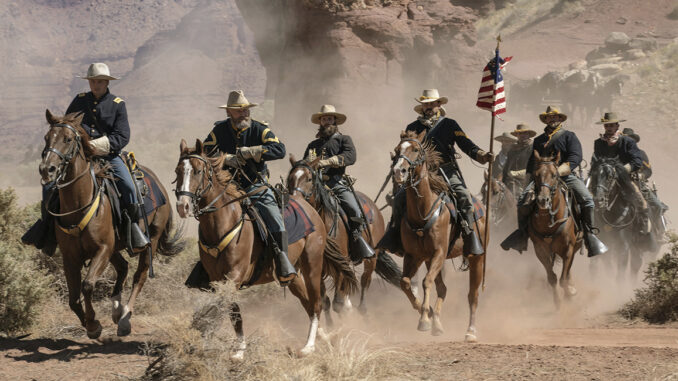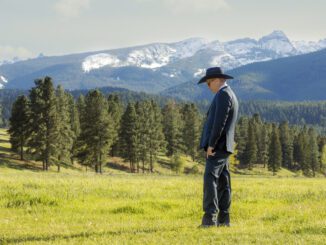
A scene deep into Kevin Costner’s new Western is when he and a woman flee bad guys on horseback. They pause at a jaw-dropping vista, and he turns to her: “You just gotta keep going,” he tells her.
That should be the slogan of “Horizon: An American Saga — Chapter 1,” the initial three-hour salvo in what could morph into a four-part epic about the West that could tax even the biggest cowboy fan.
Give Costner — co-writer, director, producer — his due. This is a labor of love he’s been thinking about since the 1980s, and he has skin in the game: To fund the film, he took out a mortgage on his 10-acre home in Santa Barbara, California. Well, one of his homes, at least.
“Chapter 1” — “Chapter 2” is to be released in August, and parts three and four depend on whether folks keep going — is a sprawling, often unwieldy pacesetter, introducing dozens of characters in different parts of the West who, one has to assume, will interact at some point. If they survive, that is.
It’s a spectacularly unsubtle movie, from the opening moment when a group of ants on a dirt hill are crushed by a surveyor’s wooden stake. If there’s any doubt about what we must feel, listen to John Debney’s ponderous score, with its criminal overuse of cellos.
Costner scrambles the plot — crafted by him and Jon Baird — almost immediately by offering a climactic battle scene within the first half hour, one in which a small white settlement in Arizona’s San Pedro Valley (thanks, southern Utah!) is sneak-attacked by Apaches during an innocent dance.
It’s a slaughter, and it lasts way too long — savagery on one side, noble victims on the other. Mothers are struck by arrows while carrying their babies, and unarmed musicians are killed without a thought. “Ready, son?” asks a dad to his teenage son, handing him a rifle and facing certain death. “I think so, Dad,” comes the spirited reply. In the aftermath, a mother cradles the corpse of her son and talks to it.
This slaughter shoots off a few story strands. Some survivors (like spunky new widow Sienna Miller and her daughter) find shelter at a U.S. Army camp led by an achingly honorable lieutenant, played by Sam Worthington. Another story arc sees bounty hunters search for the Apaches who attacked the settlement, seeking profit and revenge.
“Horizon” also shows the internal divisions within the Apaches, with the chief’s hothead son and new father (Owen Crow Shoe) ready to keep fighting. “Their sons will hunt you,” the chief warns. “I won’t sing for your victory today.” We learn that the white settlement violated agreements meant to calm the West.
Costner’s universe is both fatalistic and inevitable. Both sides may be right and wrong, but there will always be another round of savagery. “There’s no one on Earth going to stop these wagons from coming,” an exasperated Army officer says at one point.
After an hour, Costner himself arrives as a quiet, strong loner who enters a Wyoming Territory settlement with the hope of a nice drink and some lady company and yet who leaves on the run, protecting a sex worker (Abbey Lee) and a boy in her care from psychotic horsemen.
Two hours into the movie comes another set of characters, with Costner’s menu now entirely out of whack. It’s a wagon train led by Luke Wilson (never a cowboy, ever) facing some class issues — a well-off, oblivious couple are among the working-class muscle — and some Peeping Toms. It’s all too much, but add to it a dash of anti-Chinese xenophobia, some budding romances and horrific scalping.
Director of photography J. Michael Muro doesn’t romanticize anything, grinding the action in the West’s smoke, heat and chicken-pecked dust, so much so that you might taste the grit in your teeth. It helps that Costner has positioned everyone on the top of a picturesque hillside, showing off their profiles.
Part of the problem with Chapter 1 is that the editing could be better besides overstuffing it with too many characters. Viewers will need help with violent cuts in which Costner jumps the action forward months within the same chapter without any clues.
Yet Costner is still an impressive director with an eye for the natural beauty of the American West and a soft spot for loners. “Horizon: An American Saga — Chapter 1” is a giant swing that cannot stand alone, but we owe it to him to ride beside him a little more.


